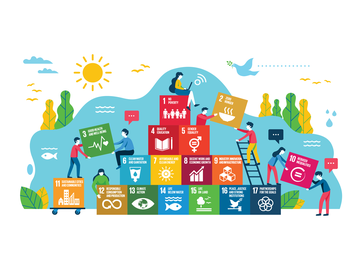Engaging Faith Actors to Support the Implementation Process of the Sustainable Development Goals (SDGs)
The course is currently offered as MOOC.
The 2030 Agenda explicitly recognizes that peaceful and inclusive societies are both outcomes and enablers of sustainable development. Religious leaders from around the world have signed statements in favour of Sustainable Development Goals (SDGs) such as peace, reconciliation, climate justice and environmental protection. It is widely recognized that religious leaders, faith-based organizations (FBOs) and local faith actors (LFAs) can play a significant role in advancing the Sustainable Development Agenda. However, there is still a need to recognize the importance of greater engagement of religious leaders, FBOs, LFAs and CSOs to work closely with national and international stakeholders to ensure that the implementation of SDGs is inclusive and participatory.
In this context, and with regard to the need for having a comprehensive and practical e-learning course on the role of faith in the promotion of SDGs, KAICIID has developed the moderated/instructor-led e-learning course, ‘Engaging Faith Actors to Support the Implementation Process of the Sustainable Development Goals (SDGs).
The modules of the course were designed in partnership with the following organizations: KAICIID, United Nations Environment Programme (UNEP), University of Peace (UPEACE), Lutheran World Federation (LWF), National Muslim Council of Liberia (NMCL), and Institut Superior de Ciències Religioses de Barcelona (ISCREB).
KAICIID launched the FAITH4SDGS Project. More information and material can be found here: https://www.kaiciid.org/content/sustainable-development-goals-sdgs
This e-learning course is specifically designed for:
· faith actors, religious leaders, faith-based organizations’ staff
· policymakers and sustainable development practitioners looking for approaches, methodologies, tools and models for successfully engaging faith actors to support SDG implementation processes
· staff of UN Agencies, international organizations and civil society organizations
· officials from national, regional and local government structures
· academia, university professors, graduate students and advanced undergraduate students interested in the key concepts and practices of sustainability
· private sector actors, such as those who work in corporate sustainability and responsibility, who want their work to be more sustainable and align with global progress
- How to raise awareness about the role and importance of engaging Religious Leaders, local faith actors, FBOs and CSOs to support implementation of the SDGs at national, local level and community level and enhance participants’ understanding of the SDGs elements, purpose, and the process of SDGs implementation
- Identifying initiatives and best practices on how to practically engage Religious Leaders, local faith actors, FBOs and CSOs into design and implementation of SDG related national and local strategies, action plans, sectoral plans and programmes as well as how to establish partnerships among various sectors
- Being engaged in practical and tested tools, methodology, models and approaches on how to greater engage Religious Leaders, local faith actors, FBOs and CSOs to engage and contribute to the design, planning and implementation of the SDG programmes and initiatives in their respective countries and communities
- Using E-Learning courses provided platform, forums and group exercises for sharing own best practices, experiences and lessons learnt.
- Promoting a systemic approach to the role of religion in humanitarian response, sustainable development, conflict resolution and peacebuilding.
Week 1, Module 1: Engaging Faith Actors to Support Implementation of the SDGs through IRD (All 17 SDGs)
Week 2, Module 2: Mainstreaming the SDGs into National Policy and Planning Processes (All 17 SDGs)
Week 3, Module 3: The Role of Faith Actors and Interreligious Dialogue (IRD) in Implementing SDG 16
Week 4, Module 4: Faith for Earth: A Time for Action (SDGs 6,13,14,15)
Week 5, Module 5: Countering Hate Speech Through the Promotion of IRD and Cooperation for Peace (SDG 16 )
Week 6, Module 6: Assessing Faith-Based Actors’ Contributions to the SDGs (All 17 SDGs)
In order to ensure the best possible outreach, the course will be delivered through an interactive online platform that allows users to take the course as a moderated/instructor-led course. Course objectives are intended to be achieved through a variety of educational methods and technologies, designed to match personal learning styles, as well as by the inclusion of non-linear learning that aims to develop ‘just in time’ learning skills for adults. At the same time, in order to allow participants to have flexibility of scheduling, the learning will be conducted in an asynchronous manner. Using state-of-the-art training architecture, the KAICIID e-learning course methodology is based on the principles of adult learning and comprises a combination of interactive and gamified course content presentations, self-assessments, online discussion forums, joint online projects, quizzes and exercises to master the use of the proposed tools and approaches, as well as peer-to-peer learning through sharing of best practices, experiences and lessons learned in the regional, country or local context.
The pedagogy has been adapted for full-time career professionals and is specifically tailored to train participants through a variety of learning methods: absorb (read); do (activity); interact (socialize); and reflect (relate to one’s own reality).
A Certificate of Completion will be issued to participants who achieve a minimum total score of 70% and who complete all the mandatory activities.
Modern and updated browsers.
E-Learning in IRD designed for the general public


